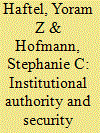|
|
|
Sort Order |
|
|
|
Items / Page
|
|
|
|
|
|
|
| Srl | Item |
| 1 |
ID:
154844


|
|
|
|
|
| Summary/Abstract |
The proliferation of regional economic organizations (REOs) is a prominent feature of the contemporary international environment. Many of these organizations aspire to promote regional peace and stability. Some strive to promote these goals only through economic cooperation, while others have expanded their mandate to include mechanisms that address security concerns more directly. A glance at the security components of such organizations indicates that their purpose and design are very diverse. This article sheds light on the sources of this poorly understood phenomenon. Specifically, it argues that organizations that enjoy greater delegated authority are in a better position to expand their mandate into the security realm and to have more far-reaching agreements in this issue area. It then develops a metric that gauges the degree of security cooperation within REOs and presents a new dataset of numerous organizations on this institutional aspect. Employing this dataset in a rigorous statistical analysis and controlling for a host of alternative explanations, it demonstrates that, indeed, REOs with greater delegated authority develop deeper security cooperation.
|
|
|
|
|
|
|
|
|
|
|
|
|
|
|
|
| 2 |
ID:
151296


|
|
|
|
|
| Summary/Abstract |
How do rising powers choose to allocate their finite resources among the multiple global and regional security organizations? Building on the literatures on forum shopping and rising powers, we argue that the different organizational investment choices of rising powers are explained by varying regional ideational affinities. Organizational settings have ideational foundations that can look very different from region to region. We argue that regional ideational affinity leads rising powers to invest in regional rather than global organizations. However, if the ideational composition of the region is highly diverse, global organizations are a better vehicle to accommodate rising powers’ emergent ambitions. To demonstrate our argument, we examine the choices of Brazil and South Africa in terms of their material and ideational investments in regional and global organizations.
|
|
|
|
|
|
|
|
|
|
|
|
|
|
|
|
| 3 |
ID:
153049


|
|
|
|
|
| Summary/Abstract |
France’s so-called exceptionalism in multilateral security policy is often explained with its Gaullist political culture. However, a closer look shows that Gaullism cannot easily capture different French policies, particularly toward NATO. To unearth what can explain policy variance, this paper asks the question of whether French political parties value NATO differently and, if so, to what effect? Looking at French governments from 1991 to 2014, I argue that political parties in France carry different values, which lead them to interpret NATO’s role for France’s security policy differently. As a result, French parties in power encouraged, delayed, or halted NATO institutional transformation at specific junctures. This argument builds on the insights of the study of ideational factors in IR and the study of party politics in Comparative Politics. Through an analysis of French governments’ policy preferences toward NATO, this paper stresses that institutional transformation can be understood through the study of veto points in conjunction with national preference formation.
|
|
|
|
|
|
|
|
|
|
|
|
|
|
|
|
| 4 |
ID:
180827


|
|
|
|
|
| Summary/Abstract |
Research on political parties and foreign policy has grown in recent years in response to disciplinary and real-world changes. But party research still bears the imprint of earlier scepticism about the role of parties. The result is scholarship which is disaggregated, which avoids difficult cases for parties, and which has focused more on showing that parties matter relative to structural accounts of foreign policy-making. This article takes stock of recent research on political parties, party politics and their role in foreign policy-making. We argue that it is time for party research not only to embrace the question of whether parties matter but also how, when and where they matter. This requires a move away from most-likely cases and the realist foil towards an embrace of the complexity of party positions. Building on International Relations, comparative politics and foreign policy analysis scholarship, we suggest four avenues deserving of greater scholarly focus: 1) ideological multidimensionality; 2) parties as organizations and the role of entrepreneurs; 3) parties as transnational foreign policy actors; and 4) the interaction between parties and the changing global order. We propose how these literatures can help identify new research questions, contribute to theory development and help define scope conditions. This will hopefully help scholars establish benchmarks for judging the efficacy of parties in foreign policy-making.
|
|
|
|
|
|
|
|
|
|
|
|
|
|
|
|
| 5 |
ID:
107615


|
|
|
|
|
| Publication |
2011.
|
| Summary/Abstract |
With the end of the Cold War, the neutral countries of Austria, Finland, Ireland and Sweden have grappled with the question of what their neutrality means in relation to membership in the European Union's (EU) Common Security and Defence Policy (CSDP) and the North Atlantic Treaty Organization's (NATO) Partnership for Peace (PfP). The concept of neutrality has continued to inform the foreign and security policies of these four neutral EU members to varying degrees, but what explains these 'varieties of neutrality' and what does neutrality mean in relation to membership in the EU's CSDP and NATO's PfP? In this article, the primary focus is on neutrality as a norm. Understanding neutrality as a norm helps clarify how neutrality becomes embedded in national identity, what it shows about the interactions between domestic belief systems and international security conditions over time, and how the definition of a norm can be revised to allow for desired policy choices. To this end, the article asserts that there are four interrelated factors key to explaining how and why each state modified its interpretation of neutrality vis-à-vis international military institutions such as NATO, and the CSDP: the reason for and timing of institutionalizing neutrality (coerced or voluntary), the form of institutionalization (de jure or de facto), political elite opinion and public opinion/belief.
|
|
|
|
|
|
|
|
|
|
|
|
|
|
|
|
|
|
|
|
|